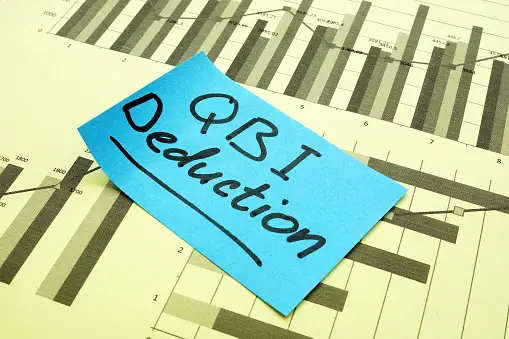The concept of tax deductions is pivotal in understanding personal and business finances. Among these, the Qualified Business Income (QBI) deduction stands out as a significant provision for small business owners and self-employed individuals in the United States. Introduced through the Tax Cuts and Jobs Act in 2017, this deduction allows eligible taxpayers to deduct up to 20% of their qualified business income from their taxable income, thus potentially lowering their tax obligations significantly. This article explores what the Qualified Business Income Deduction is, how it works, who qualifies for it, and how to ensure eligibility.
What is the Qualified Business Income Deduction?
The Qualified Business Income Deduction is a tax relief opportunity for small business owners, sole proprietors, and independent contractors who pay taxes through personal income tax rather than through a corporate tax entity. It is designed to reduce the tax rate on qualified business income, making it more economically feasible for small businesses to operate and thrive. The deduction applies to income from partnerships, S corporations, LLCs, and other pass-through entities, which comprise a large segment of the U.S. economy.
How the Qualified Business Income Deduction Works
The Qualified Business Income Deduction, established under the Tax Cuts and Jobs Act, offers a reduction of up to 20% on qualified business income for eligible taxpayers. Here’s a concise breakdown of how this deduction works:
- Eligibility: The deduction is available to individuals, including sole proprietors, partners in partnerships, S corporation shareholders, and some trusts and estates. It applies to income from domestic businesses operated as pass-through entities.
- Calculation of QBI: Qualified business income includes the net amount of income, gains, deductions, and losses from a qualified trade or business. It excludes investment income, wage income, and certain international business income.
- Income Thresholds: Full eligibility for the deduction exists for those with taxable income below $164,900 for single filers and $329,800 for married couples filing jointly (2021 thresholds). Above these limits, the deduction may be phased out, especially for specified service trades or businesses.
- Limitations: For higher income earners, the deduction may be limited by factors such as the type of business, the amount of W-2 wages paid by the business, and the unadjusted basis of qualified property immediately after acquisition (UBIA).
- Non-SSTB Advantage: Businesses not classified as Specified Service Trades or Businesses generally have fewer restrictions and can more easily capitalize on the QBI deduction, regardless of income level.
Who Qualifies for the Qualified Business Income Deduction?
Determining eligibility for the Qualified Business Income (QBI) Deduction is crucial for taxpayers to leverage this significant tax benefit. Here are essential points to understand about who qualifies:
- Type of Income: The QBI deduction is designed for owners of pass-through entities such as sole proprietorships, partnerships, S corporations, and some trusts and estates. The income must be from a trade or business operated in the United States.
- Exclusions: Certain types of income do not qualify for the QBI deduction. These include employee wages, capital gains, interest income, and certain investment-related income. Additionally, income earned through a C corporation does not qualify.
- Specified Service Trades or Businesses (SSTB): Owners of SSTBs, which include businesses in fields like health, law, consulting, athletics, financial services, and performing arts, can qualify for the deduction if their taxable income is below a certain threshold ($164,900 for single filers and $329,800 for married filing jointly for the tax year 2021). Above these thresholds, the deduction phases out.
- Income Thresholds: The QBI deduction is available in full to taxpayers with taxable income below the aforementioned thresholds. For those with incomes above these limits, the deduction may be reduced or eliminated based on the nature of the business and the amount of W-2 wages paid.
- Business Structure and Operations: The business must be operational and conducting a qualified trade or business. Passive businesses and rental real estate enterprises may qualify if they meet specific requirements set by the IRS, such as being managed as a trade or business.
- Documentation and Compliance: Proper documentation and compliance with IRS rules are essential. Taxpayers must maintain accurate records of income, expenses, and business activities to substantiate their eligibility for the deduction.
Understanding these qualifications can help business owners and self-employed individuals determine if they can benefit from the QBI deduction, providing significant tax savings and supporting business growth and sustainability.
How to Qualify for the QBI Deduction
Qualifying for the Qualified Business Income (QBI) Deduction involves a series of steps and considerations aimed at reducing taxable income for small business owners and self-employed individuals. Here are key points on how to qualify:
- Determine Eligibility: First, establish that your business is a pass-through entity like a sole proprietorship, partnership, S corporation, or certain trusts and estates. The business must conduct a qualified trade or business according to the IRS.
- Calculate Qualified Business Income: QBI includes the net amount of income, gains, deductions, and losses from your qualified business in the U.S. Exclude investment-related items, W-2 wages paid from the business, and guaranteed payments to partners.
- Understand the Income Thresholds: The full 20% deduction is available to those below the income threshold ($164,900 for single filers and $329,800 for married filing jointly for the tax year 2021). Above these thresholds, limitations based on the type of business and wages paid may apply.
- Assess the Type of Business: Specified service trades or businesses (SSTBs), such as health, law, and accounting, face restrictions if their income is above the threshold. Non-SSTB businesses have fewer limitations, making it easier to claim the deduction.
- Calculate Wages and Property Factors: For incomes above the threshold, the deduction may be limited based on W-2 wages paid to employees and investment in tangible depreciable property used in the business during the year.
- Keep Comprehensive Records: Maintain accurate financial records to substantiate income, expenses, and investment in the business. This is crucial for calculating the deduction and defending it in case of an IRS audit.
- Consult a Tax Professional: Given the complexity of the QBI deduction rules, consulting with a tax professional can ensure that you maximize your benefit while complying with the law.
By carefully navigating these steps, eligible business owners can effectively leverage the Qualified Business Income Deduction to reduce their taxable income and enhance their financial health.
Conclusion
The Qualified Business Income deduction represents a valuable tax break for eligible small businesses and self-employed individuals, offering a potential reduction in tax liability and fostering growth and sustainability in the small business sector. By understanding and navigating the complexities of the QBI deduction, taxpayers can effectively leverage this provision to enhance their financial outcomes.
FAQs
What types of businesses are excluded from the QBI deduction?
Specified service trades or businesses, such as those in health, law, and performing arts, are generally excluded if the taxpayer’s income exceeds the threshold amounts.
Are rental properties eligible for the QBI deduction?
Yes, rental real estate enterprises that meet specific requirements can qualify for the QBI deduction.
Can the QBI deduction be carried forward or backward?
No, the QBI deduction cannot be carried to other tax years; it is a use-it-or-lose-it benefit for the tax year in which the qualified business income is earned.
Does the QBI deduction reduce self-employment tax?
No, the QBI deduction does not affect self-employment taxes. It only reduces income tax obligations.




